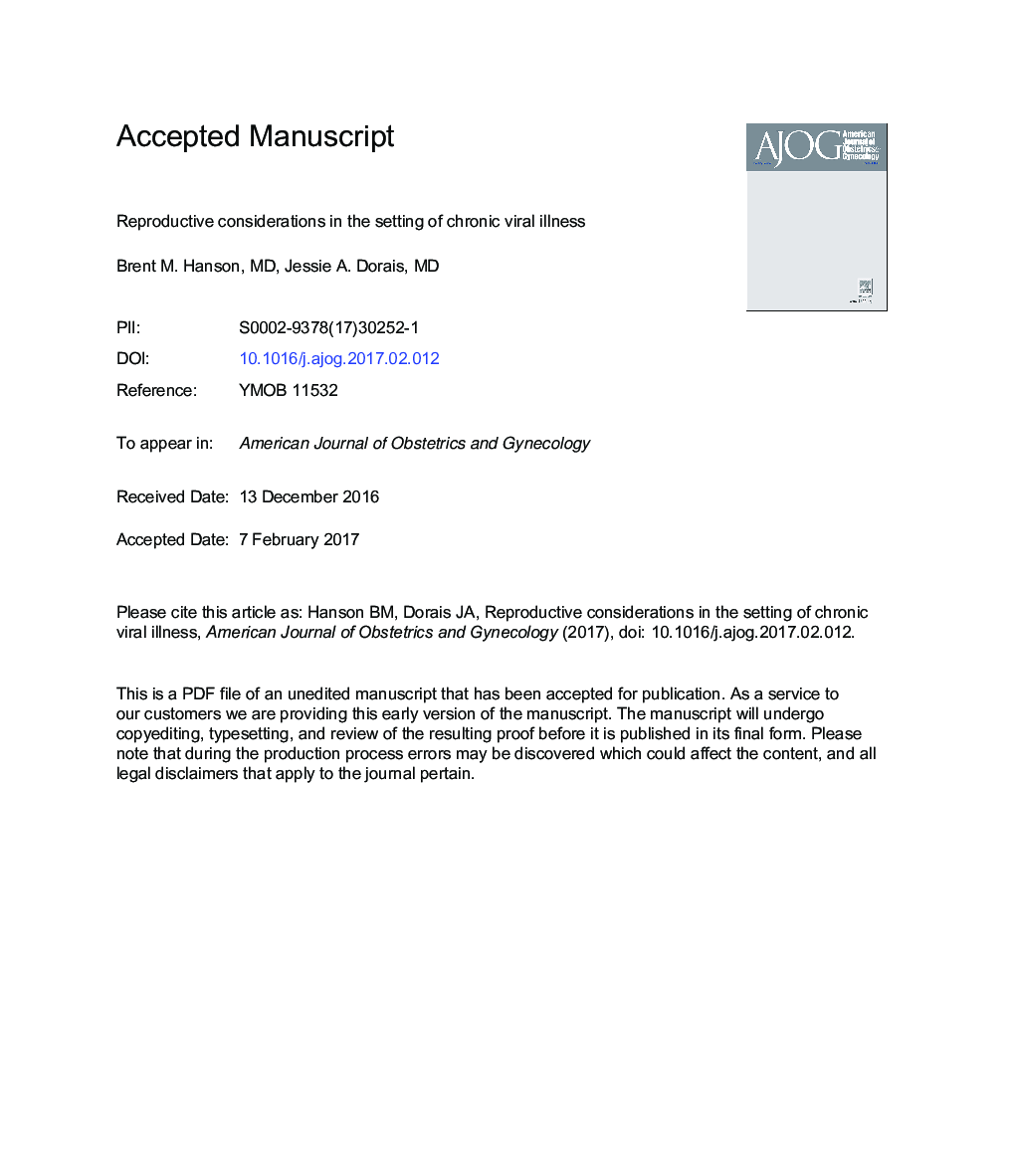| کد مقاله | کد نشریه | سال انتشار | مقاله انگلیسی | نسخه تمام متن |
|---|---|---|---|---|
| 5675708 | 1594874 | 2017 | 18 صفحه PDF | دانلود رایگان |
عنوان انگلیسی مقاله ISI
Reproductive considerations in the setting of chronic viral illness
دانلود مقاله + سفارش ترجمه
دانلود مقاله ISI انگلیسی
رایگان برای ایرانیان
کلمات کلیدی
موضوعات مرتبط
علوم پزشکی و سلامت
پزشکی و دندانپزشکی
پزشکی و دندانپزشکی (عمومی)
پیش نمایش صفحه اول مقاله

چکیده انگلیسی
Special considerations must be taken when patients with human immunodeficiency virus (HIV), hepatitis B, or hepatitis C desire to become pregnant. Patients with chronic viral illnesses desire to have children at rates similar to the general population, and options are available to decrease both vertical transmission and viral transmission between partners. Preconception counseling or consultation with fertility specialists is imperative in patients with HIV, hepatitis B, and hepatitis C so that reproductive goals can be addressed and optimized. In couples in which one partner has HIV, the use of highly active antiretroviral therapy or preexposure prophylaxis can significantly reduce the risk of transmission between serodiscordant partners. The use of density gradient sperm-washing techniques and intrauterine insemination or in vitro fertilization results in an apparent lack of transmission of HIV between partners when the male partner is HIV-positive. Vertical transmission of HIV from mother to child can be reduced by use of highly active antiretroviral therapy regimens throughout pregnancy or by cesarean delivery in the setting of high maternal viral load. Transmission of hepatitis B between partners can be eliminated by vaccinating the uninfected partner. Vertical transmission from a hepatitis Bâinfected mother to a child can be reduced by vaccinating neonates with the standard hepatitis B vaccine series as well as hepatitis B immune globulin. Recent data have shown the antiviral medication tenofovir to be an effective way to reduce vertical transmission in the setting of high maternal viral load or the presence of hepatitis B e antigen. There are multiple antiviral medications available to treat chronic hepatitis C, although access to these medications often is limited by cost. Similar to HIV-positive patients, in settings in which the male partner is infected with hepatitis C, density gradient sperm washing can be used before intrauterine insemination or in vitro fertilization to reduce transmission of hepatitis C between partners. No safe and effective method exists to reduce vertical transmission of hepatitis C once a woman becomes pregnant, highlighting the importance of treatment of hepatitis C before pregnancy.
ناشر
Database: Elsevier - ScienceDirect (ساینس دایرکت)
Journal: American Journal of Obstetrics and Gynecology - Volume 217, Issue 1, July 2017, Pages 4-10
Journal: American Journal of Obstetrics and Gynecology - Volume 217, Issue 1, July 2017, Pages 4-10
نویسندگان
Brent M. MD, Jessie A. MD,